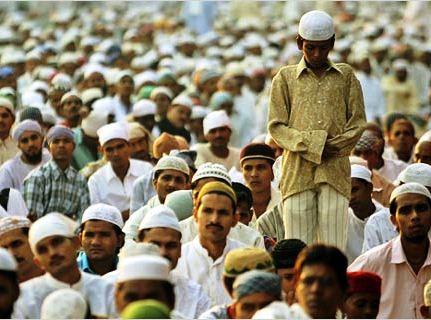By Abdul Khaliq
Following an article in Indian Express (‘Like never before, I the Muslim am seen as the root cause of nation’s problems’, IE, September 27), in which I expressed dismay at the unfettered hatred being spewed against a community in public, I got a personal taste of the frightening, communally surcharged situation in the country. The hundreds of responses on social media were near unanimous in condemning me for my sectarian bias. In a sweeping criticism that brands a community for every crime committed by its deviant elements, I was reminded that the appearance of black ISIS flags in Kashmir and Kerala showed that Muslims are traitors; that Muslims are guilty of forcible conversion; that the eviction of Pandits from Kashmir clearly shows there is no place for non-Muslims wherever Muslims are a majority. The lone voices who understood my angst were the usual suspects — the “pseudo-secularists”.
Significantly, a recurring theme in the criticism is that Muslims, who are so sensitive to hate-mongering by others, are studiedly quiescent when their leaders indulge in the most inflammatory rhetoric. As one tweet succinctly put it, “Whenever the Owaisi brothers, Imam Bukhari, Azam Khan trash our homeland, our religion, our leaders, you Muslims do not speak up.” Do you notice the “us” as distinct from the “you” in the tweet? Even six decades after Partition, there is no let-up in the pathological distrust and incomprehension that separate Hindus and Muslims.
More than ever before, Muslims need an enlightened modern leadership that can fight systemic discrimination, and also bridge the gulf between Hindus and Muslims. Unfortunately, what they have are media-advertised, self-appointed Muslim leaders — the deadly free-riders who have, through their divisive hate-mongering, further corralled Muslims in their ghettos. Much to the delight of their blood brothers — the extreme Hindu rightwing — these leaders are further fuelling the communal cauldron with their competitive bigotry. Instead of upholding heterogeneity, Asaduddin Owaisi’s contribution to the raging conversion debate is to state that every person who enters this world is Muslim. Fanning divisive fires, Azam Khan has accused the BJP of conspiring to demolish the Taj Mahal, which he claims is Waqf property. In a stunning example of depravity, Haji Yakub Qureshi has announced an award of Rs 51 crore for the killers of the cartoonists in Paris. A friend, frustrated at the shenanigans of these rabid hatemongers, suggested that at the height of the next communal riot, they should be air-dropped into the thick of battle to reap the whirlwind of their poisonous rhetoric.
By granting these leaders high visibility, the media has portrayed such perverse bluster as representative of Muslim thinking. Sane voices of the community have been fighting Hindu and Muslim fundamentalism but they are not heard amid this din. Moreover, in today’s India, deeply entrenched prejudice is hardly touched by liberal, secular persuasion.
The Muslim leadership is guilty of ethnocentrism in which “one’s own group is the centre of everything and all others are scaled and rated with reference to it” (W.G. Sumner). It is a way of thinking that is suicidal for minorities in a multi-religious society, as it discourages pluralism and the egalitarian ethos. Transfixed in their monomania, these leaders are unconcerned with issues of social justice relating to class, gender, globalisation and agrarian distress. The archetypal obscurantists have been accomplices in resisting individual freedom, as witnessed in Kerala, where the rightwing Muslim party, the SDPI, joined the Bajrang Dal and others in attacking “Kiss of Love” protestors for “contaminating” Indian culture. Their exclusionary, parochial view has wreaked havoc by hardening prejudice and discrimination against the community. The embattled Muslim wants desperately to reach out across the communal divide and integrate with the rest of society in a spirit of fraternity, but he is foiled by leaders who seem bent upon using him for their cynical power games.
The venality and opportunism of Muslim leaders have exacerbated social tensions, isolated the community and deflected attention from the issues that really matter. The stark reality is that Muslims languish on the margins of society, at par with the Dalits. The Amitabh Kundu Committee, which had been mandated to evaluate the socio-economic status of Muslims post the Sachar Committee, has in its recent report concluded that poverty levels among Muslims remain higher than the national average; that Muslims are educationally the most backward; that the percentage of educated, unemployed youth is highest among Muslims; that Muslims are the worst off in access to healthcare.
Muslims can benefit only if there is equal treatment in education, access to healthcare, the job market, before the law. Instead of provocative machismo, Muslim leaders need to focus on solutions to systemic discrimination through dialogue, empathy with others similarly placed across society, introspection and self-criticism, negotiation and understanding contrasting viewpoints, political savvy and, if need be, lawful civil protest. The present leaders, limited by sectarian prejudice, are certainly not up to the challenge. Sadly, the community seems bereft of community-transcending, transformational leaders with a circumambient vision who can take on the bigots within and outside the community. Will Javed Akhtar, at least, step forward?
(The writer, a former civil servant, is secretary general of the Lok Janshakti Party. The article was first published at Indian Express)






















